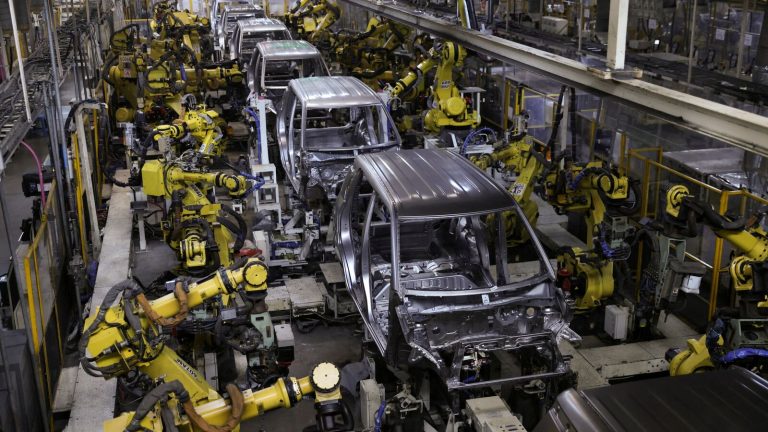Maruti Suzuki India Ltd is concerned about the Indian car market’s growth prospects due to consumers’ diminishing interest in paying more for small cars.
The country’s largest car seller witnessed just 3% growth in its domestic car sales on-year in 2024-25, while its net profit grew by 7.5% to ₹14,500 crore and revenue 7.7% to ₹1.53 trillion.
For the March quarter, the carmaker’s consolidated profit declined 1% to ₹3,911 crore on-year, as against Bloomberg’s estimate of a nearly 7% fall.
“Growth in the domestic market has been very limited. For a country with such low penetration of cars, the growth rate of 2-3% is not going to increase it at all. It is a matter of some worry,” said R.C. Bhargava, chairman of Maruti Suzuki, during a post-results media briefing.
Bullish on international markets
However, Maruti Suzuki is increasingly optimistic about the international markets. In 2024-25, the company exported 332,000 units, up 17.4% from 283,000 units in the year-ago period.
“We are growing better because exports have been very buoyant. In the coming year, exports are expected to grow by 20%. This is going to be the main driver for our production, sales, and profits,” added Bhargava.
The major worry, according to the Maruti Suzuki chairman, is that those who can afford small cars find them expensive. “Unless something changes, the domestic market will remain muted. In this current year, sales of small cars have declined by about 9%. If there is such a decline in the sales of cars that can be afforded by 88% of people earning, how can we expect growth?” Bhargava asked.
Car retail sales grew by just about 5% in the last fiscal year. Over the last few months, the inventory levels of major car markets also shot up to over 50 days, according to data from the Federation of Automobile Dealers’ Associations (FADA).
“Current inventory levels vary significantly, with Mahindra and Mahindra maintaining over 30 days of stock, while Hyundai’s and Tata’s inventories extend to 50-55 days. Maruti’s stock has risen from 9 days as of 1 January to around 40-45 days,” analysts at PhillipCapital said in a 30 March note.
Analysts hope that the income tax cuts introduced by the government in the 2025 budget will provide a boost to domestic car sales.
However, Bhargava is sceptical.
“To boost demand, small cars have to become more affordable,” Bhargava said. “It is not the case that India has become affluent and everyone wants to buy more expensive cars.”
Carmakers in the country have implemented several price hikes over the last few months. Maruti Suzuki raised prices thrice in 2025, resulting in a more than 4% price increase.
EV boost
Meanwhile, analysts remain optimistic about Maruti Suzuki’s long-term performance due to the launch of electric vehicles (EVs).
“The performance of Maruti was mixed as the small car segment remained under pressure. In the near term, the weakness in margins will remain a concern for growth. Still, expansion in exports and the launch of EV portfolio can be good growth drivers,” Sanket Kelaskar, equity research analyst-auto at Ashika Group.
Maruti Suzuki announced the launch of its EV e-Vitara in January. During the briefing, the company announced that domestic EV sales will start before the end of September in 2025-26.
During the fiscal year, the company will roughly produce 70,000-80,000 EVs. However, a majority of these will be exported due to the limited scope of growth in the Indian market. “Until the number of people who can buy cars increases substantially, there will not be much growth in any kind of cars,” Bhargava warned during the call.
Earlier, Maruti Suzuki’s management had expressed scepticism about the EV growth prospects due to issues faced by consumers.
Consumers were seeing EVs as secondary cars, said Partho Banerjee, senior executive officer-marketing and sales, Maruti Suzuki India, earlier. “EVs sold today are not primary cars, but rather secondary. Until we don’t solve customer concerns on range, charging infrastructure, and post-sales, buyers will not have confidence,” he said during a media briefing on 1 April.
In 2024, India sold nearly 100,000 electric cars, 20% more than in 2023. However, the penetration in the overall car market remained low at 2.5%, showed data from the Vahan portal.
Maruti Suzuki’s shares closed 2% lower on 25 April after the result announcement, against a 1.67% fall in the Nifty Auto. Overall, Maruti’s share price has risen by 4% during 2025, as against the Nifty Auto’s 5% fall.



